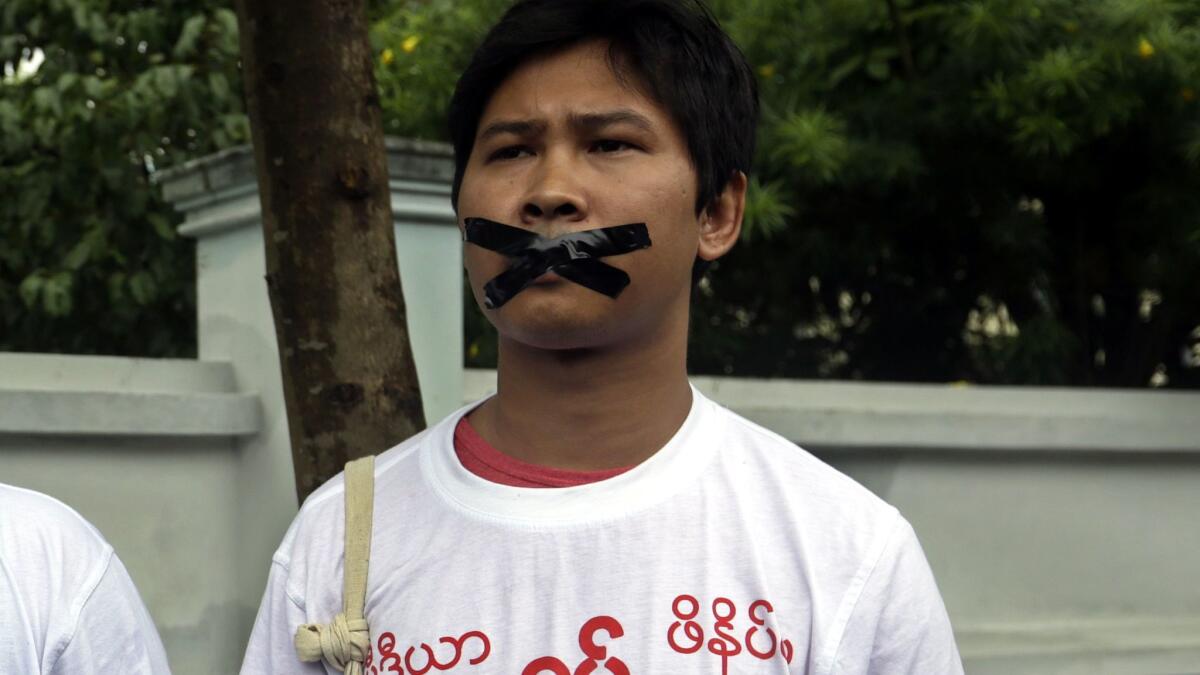Editorial: A record number of journalists worldwide are behind bars for doing their jobs

- Share via
This last year has been a dangerous one for journalists around the globe — a record 262 men and women are imprisoned because of the nature of the work they do, according to the Committee to Protect Journalists. It’s part of a disturbing trend of attacking and undermining institutions that exist to hold public officials accountable and to bring light into some of the darkest corners of the world.
Turkey and Egypt — two U.S. allies — and China account for about half of the detained journalists, but the problem extends widely. Here’s what happened just this week: Two Reuters staffers who had been working on stories about the Myanmar government’s violent ethnic cleansing of the Rohingya in Rakhine State were arrested under that country’s Official Secrets Act; a journalist writing about corruption was jailed in Tajikistan; and a French documentary filmmaker was detained in Kashmir by Indian authorities.
Most appalling is that the list of 262 includes some journalists who were nabbed a decade ago or longer by governments that have refused to divulge their whereabouts or even whether they are alive; some are likely dead. In fact, the Committee to Protect Journalists reports that 37 journalists were killed this year; 13 of them were murdered and the rest were killed covering combat or working in other risky conditions.
President Trump doesn’t bear the responsibility for these deaths and internments, of course. Over the last decade, the annual number of jailed journalists averaged 183, with a low of 125 in 2008. But Trump’s rhetoric has given cover to regimes that not only have oppressed journalists, but seek to discredit their work.
Trump’s rhetoric has given cover to regimes that not only have oppressed journalists, but seek to discredit their work.
Trump has spent more than a year attacking critical coverage as “fake news”; taking his cue, authoritarian regimes have used similar language to dismiss coverage that exposes scandals, highlights egregious behavior or simply displeases them. The Chinese Communist Party newspaper, the People’s Daily, ran an op-ed recently citing Trump’s “fake news” screeds as cause to distrust all U.S. coverage of China and its policies. Arguing that China has been the victim of distorted Western coverage for years, the paper wrote: “If the president of the United States claims that his nation’s leading media are a stain on America, then negative news about China and other countries should be taken with a grain of salt since it is likely that bias and political agendas are distorting the real picture.” Syrian President Bashar Assad and Venezuelan President Nicolas Maduro similarly dismissed negative coverage of their repressive regimes’ actions as “fake news.”
Since before he won the election, Trump has worked like no other mainstream U.S. political figure to undermine national institutions, from Congress and the courts to the media. Addicted to the spotlight, Trump is incapable of accepting coverage that legitimately exposes errors and shortcomings of his administration, and seems to awaken every morning with a chip on his shoulder bearing the logo of whatever news outlet he happens to be picking a fight with at the time.
Pushback against negative coverage is both reasonable and expected, but Trump’s efforts to sow doubt about the essential nature and mission of news organizations veers into dangerous territory. Although press freedoms in the United States remain robust, Trump’s acerbic tweets make one wonder whether the president feels a twinge of envy when he sees Turkish President Recep Tayyip Erdogan shuttering news outlets critical of his repressive policies, or jailing hundreds of journalists with impunity. (The crackdown began after a failed coup in 2016; the Committee to Protect Journalists lists 76 reporters, whom Erdogan describes as spies or terrorists, still in jail.)
It would be quixotic to think that Trump will change his rhetoric or even care about the damage he causes when, as the leader of the free world, he openly undercuts the notion of a free and independent media. But his disregard for a free press fits in with his administration’s dangerous abdication of America’s traditional role as defender of human rights around the world. Yes, ours is an imperfect record complicated by acts of injustice within the United States itself, but the United States still must stand by the principles of universal human rights, democracy, and the open and free exchange of ideas. And the president must end his undercutting of the media. Instead of giving repressive governments cover, he should be calling out regimes that lock away, or kill, those who would question them.
Follow the Opinion section on Twitter @latimesopinion or Facebook.
More to Read
A cure for the common opinion
Get thought-provoking perspectives with our weekly newsletter.
You may occasionally receive promotional content from the Los Angeles Times.









